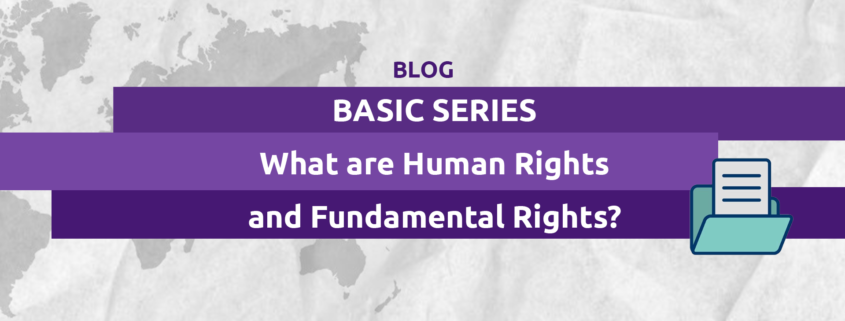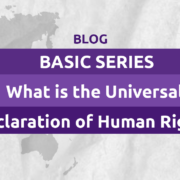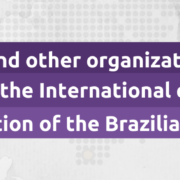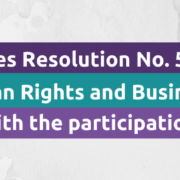What are Human Rights and Fundamental Rights?
Human Rights and Fundamental Rights
The terms “human rights” and “fundamental rights” are mentioned all the time, often as synonyms or without an in-depth analyses of its true meaning. Even in our current Federal Constitution, promulgated in 1988, the differences of human rights and fundamental rights are not very clear. Yet, the so called “Citizens’ Constitution” was the first Brazilian Constitution to make reference to its famous 5th Article, although it was addressed only in a general way. (link para epígrafe do título II, e artigo 5º parágrafo 1º).
After all, is there a difference between human rights and fundamental rights?
The classical natural law theory understands that both the human rights and fundamental rights arise from the alleged existence of natural law, as it was known in the Roman law. However, it is necessary to take into account that, regardless of being related, the fundamental rights and its theory may differ from the human rights. And that because those are grounded in the constitutional pact that integrate parliamentary interests, while those are mainly based on a internationalist and pro se bias. Thus, the importance of its differentiation.
From a broad perspective, the fundamental rights are constitutionally recognized and insured by a certain State, while the human rights have a direct relation to International Law documents.
Human Rights and fundamental rights in Brazil
The milestone of the internationalization process of human rights, that would start relying on a certain international protection, was the Universal Declaration of Human Rights (UDHR), proclaimed in the year of 1948 at the UN. At first, the document was a non-binding instrument, that is, their signatories did not have to adhere to it at that moment. Even then, the document was just the begging of a series of treaties that would arise in the next decades, as the pact of Economic, Social, Political and Cultural Rights of 1966, and the Regional Human Rights Protection Mechanisms (European, American, and African). Nowadays, the UDHR is considered jus cogens in International Law, that is, of obligatory compliance of everyone, regardless of its signature or ratification.
In the Americas, the milestone was achieved two decades later. On the 22nd of November 1969, a Specialized Inter-American Conference on Human Rights was held in San José, Costa Rica, in which the American Convention on Human Rights was subscribed. The Convention came into force in 1978. However, in 1992 Brazil ratified the document, which became known as the Pact of San José. The treaty committed the ratified countries of the OAS to the protection, respect, and reassurance of human rights, and these regulations are grounded in the human beings qualities, which justifies an international protection of such rights. The Convention also prescribes that members have the obligation of adapting their internal guidelines in order to achieve the protection of these rights.
Regarding the fundamental rights, the Federal Constitution of 1988 makes of Brazil as being the country with the most complete system of fundamental rights in accordance with the human rights. Nevertheless, the country has a system that makes the internalization of Human Rights treaties difficult, and that can be seen by the time it took for the country to ratify the American Convention.
In addition, Brazil also has structures and institutions with serious and systematic violations of human rights, as an example there is the high rates of homicides, mainly among the black population, police violence, the violence suffered by the traditional people, the situation of the prison system, and the blatant of violations and crimes by business, whose victims don’t get any restitution or access to justice.
Reinventing Human Rights
As we have already said, the classical theory of human rights defend them as being natural laws, which are universal and indivisible, and applicable to everyone. However, that line of thought is shown to be inefficient when it comes to the reality that are presented to us, mainly in the global south, where several vulnerable groups have their most basic rights being systematically violated. Nowadays, many people say that we are dealing with a human rights crisis, with very few treaties being subscripted in the last years, and with an ongoing offensive to the multilateral perspective and rights that we thought to be already secure.
The Spanish professor Joaquim Herrera Flores, in his work known as “A reinvenção dos direitos humanos”, argue that these rights must not be confused with the documents that standardize it. The treaties are not the ones that create them, but the peoples process of fighting and claiming access to certain material and immaterial goods.
Therefore, the human rights wouldn’t be natural, but product of claims, and can be at any time lost, which makes the need for us to always communicate with the base and recover them. These are rights that come from bottom up. This is a critical way of analyzing the Human Rights theory.
Boaventura de Sousa Santos, prestigious professor at the Faculty of Economics of Coimbra University is a researcher of the critical theory, and perceives the actual construction of human rights and globalized localisms, that is, cultural socio-political elements that make part of hegemonic States and are associated and absorbed by peripheral countries, as a type of globalization that comes from “top down”.
But, just like Herrera Flores, Boaventura believes that it is possible to make them effective. To this end, it would be necessary to establish a connection between different cultures and understanding about the personal and social emancipation. According to the author, all cultures are incomplete and have problems, making the dialog between cultures an essential tool for the elaboration of an effective Human Rights system built from bottom up.












Leave a Reply
Want to join the discussion?Feel free to contribute!